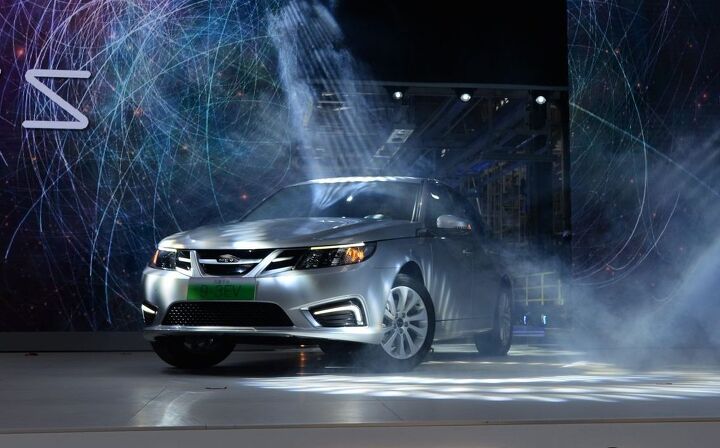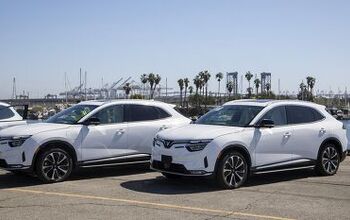World Domination: NEVS Re-launches 9-3 EV in China, Swedish Production Planned for Next Year

The Saab 9-3 has to have one of the strangest histories of any automobile ever to reach mass production. Intended as a replacement for the 900, the model used a pair of GM-based platforms split between two generations before dying out when Saab went bankrupt in December of 2011.
The company’s assets were purchased by National Electric Vehicle Sweden the following year. NEVS spent the following years attempting to relaunch the 9-3 as an all-electric vehicle. Despite multiple occasions where it seemed like the project had stagnated into oblivion, the firm actually started assembly on a rebadged 9-3 EV sedan in Tianjin, China, this December.
Now the company is saying it intends to expand production to Saab’s vintage factory in Trollhättan, Sweden, while also considering adding additional facilities in China and Turkey. Who could have imagined that the world’s next hot-ticket EV would be a model introduced in 2002 under a defunct nameplate?
“We are embracing a once-in-a-lifetime opportunity in the automobile industry with the adoption of new technologies moving forward way faster than we expected,” NEVS chairman Kai Johan Jiang said in an interview with Bloomberg. “Car-sharing, electrification of automobiles and autonomous driving are the inevitable trend of future transport.”
Taking advantage of China’s obsession with electrification, NEVS has contacted municipal governments, including those in Shanghai, Hangzhou, and Chengdu, about setting up its second factory in the country.
Meanwhile, the car is also slated to become “the national car” of Turkey. The chairman of Union of Chambers and Commodity Exchanges, Rifat Hisarciklioglu, explained that the national EV project received additional backing from local suppliers last month and should be progressing nicely. While Turkey has the intellectual property rights to build the Saab 9-3, it does not have rights to use either the Saab or NEVS name and will be forced to develop a new brand.
“Century-old automobile giants are racing with each other in new-generation car technologies. So now is the right time for the Turkish automobile,” Hisarciklioglu said. “We will work very hard for three or four months to analyze the alternative technologies and funding options.”
Back in Asia, NEVS has stated its new facility has an annual production capacity of 50,000 electric vehicles at the moment. But it intends to expand volume to around 220,000 annual units in the years to come. Jiang says NEV has already received orders for about 300,000 electric cars in China and was given one of 15 new-energy vehicle production licenses issued by the country. The next step, he says, is fundraising.
“We would like to line up investors who have the same vision as us,” stated Jiang. “We didn’t want to raise funds previously because we were not ready, but we are now.”
The NEVS-badged 9-3 EVs has a claimed range of 186 miles and features wi-fi connectivity, over-the-air update software capabilities, and smartphone-controllable vehicle charging. The company has also said it wants to develop a crossover version of the vehicle but understands it still has a difficult road ahead of it.
“Being an early entrant to the electric-car industry doesn’t guarantee the company will be a strong player,” Jiang said. “It is like great waves sweeping away sand — 95 percent of companies won’t be able to survive, given that the threshold of electric car making is quite high, so passion alone won’t nail it.”
[Image: National Electric Vehicle Sweden]

A staunch consumer advocate tracking industry trends and regulation. Before joining TTAC, Matt spent a decade working for marketing and research firms based in NYC. Clients included several of the world’s largest automakers, global tire brands, and aftermarket part suppliers. Dissatisfied with the corporate world and resentful of having to wear suits everyday, he pivoted to writing about cars. Since then, that man has become an ardent supporter of the right-to-repair movement, been interviewed on the auto industry by national radio broadcasts, driven more rental cars than anyone ever should, participated in amateur rallying events, and received the requisite minimum training as sanctioned by the SCCA. Handy with a wrench, Matt grew up surrounded by Detroit auto workers and managed to get a pizza delivery job before he was legally eligible. He later found himself driving box trucks through Manhattan, guaranteeing future sympathy for actual truckers. He continues to conduct research pertaining to the automotive sector as an independent contractor and has since moved back to his native Michigan, closer to where the cars are born. A contrarian, Matt claims to prefer understeer — stating that front and all-wheel drive vehicles cater best to his driving style.
More by Matt Posky
Latest Car Reviews
Read moreLatest Product Reviews
Read moreRecent Comments
- Carson D Just don't be the whistleblower who reports on the falsification of safety data. That's a deadly profession.
- Carson D I'd have responded sooner, but my computer locked up and I had to reboot it.
- Todd In Canada Mazda has a 3 year bumper to bumper & 5 year unlimited mileage drivetrain warranty. Mazdas are a DIY dream of high school auto mechanics 101 easy to work on reliable simplicity. IMO the Mazda is way better looking.
- Tane94 Blue Mini, love Minis because it's total custom ordering and the S has the BMW turbo engine.
- AZFelix What could possibly go wrong with putting your life in the robotic hands of precision crafted and expertly programmed machinery?


































Comments
Join the conversation
If they resurrected the 9-3 droptop as an EV I'd gladly wait in line for one.
"Intended as a replacement for the 900". Not really - the 9-3 replaced the previous 9-3, which started out life badged as a 900 itself. I suspect, if Saab had intended to spiritually replace the 900, they would have named its successor the 900.